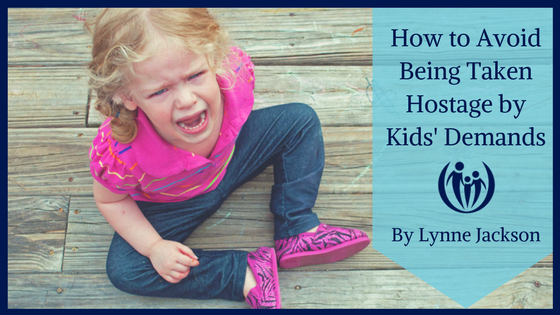
How to Avoid Being Taken Hostage by Kids’ Demands

Parents sometimes feel like hostages to the intense demands of their children, intimidated into submission with the threat of “the big gun” – a deafening meltdown. One of our online course participants asked for help:
Our 3 1/2 year old son often wants a specific plate or cup. So if we set him up with one that he doesn’t like, he can be very vocal about it. Sometimes our initial reaction is something like “It doesn’t matter if you have the blue cup or the orange cup. Why can’t you be flexible & move on?!?! Get over it!” But perhaps he wants to exercise his choice & preference.
The implied question is, “Is this a battle I should pick?” It’s a question that reinforces the “me against my kid” mindset that can feed combative attitudes on both sides.
A much better way to look at this kind of challenge is, “How can I give my child the best shot at learning something helpful through this?”
So, back to our situation — how can parents help rigid, demanding kids learn the flexibility that will serve them well in life? Let’s dig a little deeper, because helping starts with understanding.
Kids are controlling for good a reason. They almost always feel internally out of control and need to control something. Having some control helps them feel less anxious inside. (This anxiety can be related to emotional or sensory sensitivity, or some other internal or external stressors.) So when we spit out our typical response of, “Why can’t you be flexible & move on?!?!”, it’s not really helpful. This response is rooted in a judgment that there is no good reason for the behavior, and the child should just stop it.
The Connected Families Framework guides us toward truly helpful responses toward rigid, demanding kids:
Foundation: (what’s going on in me about this issue?)
An inner mindset of “Oh, no you don’t. You’re not going to win this one!” means I’m being just as inflexible as my child! Instead I can take a breath and consider – “What does my child really need right now? How can I stay peaceful and purposeful in this?”
Connect: (express love no matter what)
Anxious kids need to feel understood. That takes more than just a quick “I know you’re frustrated, but…”. Express real empathy — don’t fake it. (Even a ticked off 3-year-old will smell that a mile away.) Consider how you felt when something didn’t go the way you planned. Try two or three thoughtful statements, with a bit of a smile: “Hey, buddy, you really like that orange cup, don’t you? The Spiderman picture on it is really cool. You’re sad because it’s in the dishwasher. Sometimes it’s hard when something doesn’t go how we want.”
Coach: (build wisdom and skills)
Your child has a valid need for some healthy (not controlling) power. Offering two simple “You can… “ choices are great at helping a child feel empowered. For example:
- (1) You can ask me in a kind way, and I’ll wash the orange cup for you, or (2) we can put your favorite drink in the blue cup. What would you like to do?
- Today is a blue cup day, but you can help me pour the juice in it! You can have (1) apple juice or (2) orange juice – which would you like?
You can also check out this post about how to teach kids about flexibility with a pipe cleaner.
Correct: (hold kids accountable)
Holding a child accountable for his actions starts with training outside the context of demands or rigidity. With simple explanations and roleplays when all is calm, even young kids can learn that being demanding is not helpful and won’t get them what they want. Then when your intense child screams for his cup, it’s easier to say, “You’re having a hard time asking nicely for your orange cup today like we talked about, so I can’t give it to you. BUT, I’ll make sure it’s ready for you tomorrow when you try again! Watch me draw an orange cup on this note to remind me.”
If your child is able to get through the situation and make a choice without a meltdown, celebrate that he’s getting so much more grown up. His flexibility made it a more peaceful meal for everyone and he’s learning something that even some adults have trouble with!
Want to learn more about these concepts? Download our one hour recording of a Discipline That Connects workshop.

